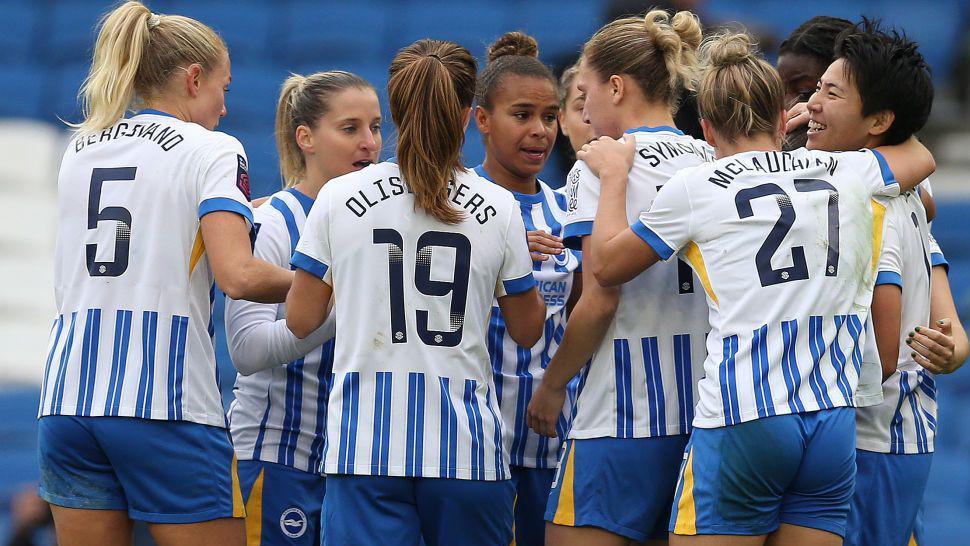Female footballers might need 'different pitch type' to cut injury risk

Brighton had three players called up to the Lionesses squad on Tuesday
- Published
Brighton chief executive Paul Barber believes female footballers might need "a different type of pitch" to reduce the risk of injuries.
Barber says the club are exploring the safety of various surfaces as part of plans for a purpose-built stadium for their Women's Super League team.
Brighton are finalising an agreement on the chosen location for the ground, which will be close to the men's team's Amex Stadium.
Barber says he is "convinced" surfaces built for men's football can be a contributing factor to injuries sustained by female players and has called for more research.
Brighton are preparing their own research, likely to be in partnership with local universities, to ensure the surface of their new women's pitch is suitable.
"If pitch surfaces are contributing, is that because we are preparing them for male athletes?" Barber told BBC Sport at a Women In Football event.
"We are starting to pull together a brief. If we're building this pitch and investing that kind of money, it makes absolute sense to get it right.
"There has been a lot of coverage recently on the quality of surfaces women's footballers have been asked to play on and for us, the whole basis of building a women's stadium is to show as much respect to the female athletes as we do to the men's.
"That should include the quality of surfaces as well. That is from the base point of how they are built to how they are surfaced and prepared on match days."
Stadium to feature breastfeeding rooms and baby changing areas
Barber says the new stadium will provide facilities catered towards women's football fans and will be more family-orientated.
Among the facilities will be breastfeeding rooms, baby changing areas and 'buggy parks' for prams to be stored.
"In most football stadiums in our country, we don't have [those facilities] because they were not built for female athletes or an audience that follows women's football," said Barber.
Brighton are yet to receive planning permission for the women's stadium but are "inching towards the final piece of the puzzle".
"We have a location that we are now finalising with the landowner. It's complex because of where it is, who owns it and how it's got to work," Barber added.
"We're really excited and it's something we're really committed to delivering. We've always said we wanted to be as close to the Amex as possible.
"Logistically that means we can share resources there like groundstaff, machinery and equipment for example. It will be closer to the Amex than Brighton's city centre."
Uefa must help tackle 'unacceptable' pitches - Bompastor
- Published21 March
Relegation, investment and FFP
The Women's Professional Leagues Limited (WPLL) are currently proposing several changes to the structure of the women's game with the aim of helping to grow it.
Clubs will be asked to discuss and vote on any proposals at their quarterly shareholders meetings - one possible change would be the temporary scrapping of relegation from the Women's Super League.
Barber says it is not something Brighton's board have addressed but he welcomes proposals for change.
"I think it is right that the WPLL are looking at every single avenue to accelerate the growth of the women's game," said Barber.
"If that means we need to give owners more security in order to invest faster, we have to consider that. I'm not saying it's right or wrong - but just that we need to have every argument on the table."
Barber said WSL clubs "understand" they will endure financial losses for a period of time as they invest in women's football but added that they must look to make it sustainable.
"The most important thing is that we are investing in the right things to turn around that position in the not-so-distant future because we can't just run women's football clubs at a loss forever," he added.
"That doesn't make any sense for anyone and isn't healthy for aspiring future female athletes who want to come into an environment, be paid properly and looked after.
"We have to create a business that is sustainable for the future."
Asked whether he would welcome Financial Fair Play regulations in the WSL, Barber added: "I think it's a balance of not constraining investment but at the same time not accelerating losses. It's so difficult.
"The key thing is learning as many lessons as we can from the men's game so we don't lead football clubs into more precautions positions.
"I would expect in the new governance bill, that in time, there will be more parameters around spending [in the WSL]."
Related topics
- Published26 June 2023
